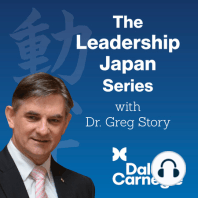9 min listen

481: Emotional Fitness For Leaders (Part One)
481: Emotional Fitness For Leaders (Part One)
ratings:
Length:
12 minutes
Released:
Sep 14, 2022
Format:
Podcast episode
Description
Dr. Emily Anhalt is an American psychologist who has created a gym for mental health, based on research she did with 100 leaders and 100 psychologists who were treating leaders. She identified seven factors which measure how “fit” we are in this sphere of mental health. Does any modern leader believe things are going to ease off and leading will become less stressful and more relaxed? I certainly don’t. The problem is many of us grew up in the era of harden up, “soldier on” with strife and troubles, suck it up, grit your teeth and bear it. That era’s level of technology, speed of business, global matrix connectivity was far removed from the complexity we all face today. We need to be as fit mentally, as we all strive to become physically. Let’s take a look at the good Doctor’s suggestions. Learn your emotional triggers and biases This is familiar territory for me because I teach a course called Disagree Agreeably and this is where we look for what we call “Hot Buttons” or triggers that get the temper rising, the blood pressure pulsing and the body heat to climb rapidly. My wife assures me my temper is getting shorter as I get older. She is probably correct and there are no shortages of things to irritate me, starting with Covid and all that it brings with it. The ability to ignore these irritants isn’t easy to develop, but we can work on how we respond. We recommend using a cushion between the offending declaration and our reaction. It is a benign sentence which neither diminishes nor inflames the situation but which acts as a circuit breaker to stop us shooting our emotion laden mouth off, before we have a chance to engage our brain first. It can be a simple as saying, “thank for raising this topic, it is an important one”. For me, that takes about 4-5 seconds to say and that is enough time to overrule the impulse to launch forth with the first thing which pops into my head and instead to plumb a more considered response to whatever nonsense my interlocutor has been sprouting. Understand the emotions of others I can’t recall the author of this saying, but it is a goody: “Remember everyone in life is carrying a heavy load”. While I was in hospital recovering from a near death experience with pneumonia, after spending six days in the Intensive Care Unit, I was reflecting on life. I thought that I should be less judgmental and intolerant of others. I was reminded of this “carrying a heavy load” idea. We have all read about the lives of the rich, famous and prominent and there is no shortage of problems facing them, so money isn’t an insulation from trouble. They may have different “heavy loads” but they are carrying them too. So if we get annoyed with someone, stop for a moment and reflect that “everyone in life is carrying a heavy load” and we may be better able to adjust our high expectations for their behaviour. Find comfort in discomfort Human beings are wired to avoid discomfort, which is why we all lead these amazing lives full of gadgets to make things easier for us. Around the world, Karate dojo are having a hard time getting students, because there is a lot of discomfort in the training and the younger generation would rather sit on the sofa and play video games. Difficult things are difficult and we have to face that reality and get on with it. When I first started Karate training at 17, it was more confusing than uncomfortable, because I wasn’t coordinated enough or good enough to do difficult things. As I progressed through the ranks, I could do more complex things. This is where the discomfort factor took off. The point is it was a gradual process of adjustment. My ability to find comfort that I was getting faster, stronger, better was traded against the pain and discomfort involved in the process. When we can understand that trade off, we can put up with the discomfort because there is a bigger goals in front of us. The pace didn’t go from zero to a hundred though.
Released:
Sep 14, 2022
Format:
Podcast episode
Titles in the series (100)
1: Flexible Japan - Stop Dreaming: japan.dalecarnegie.com by The Leadership Japan Series